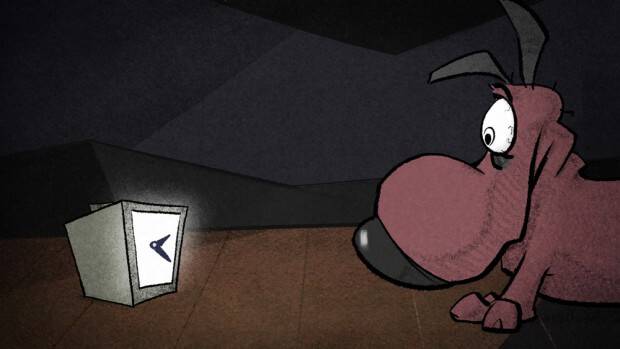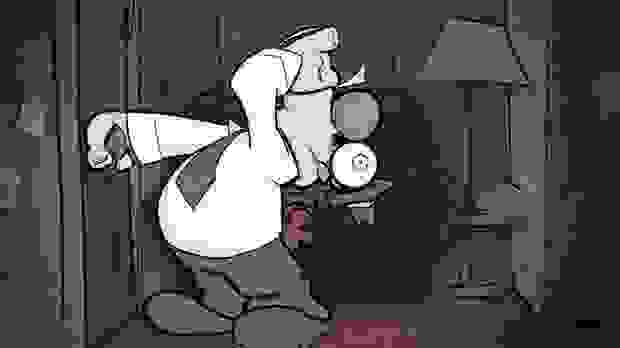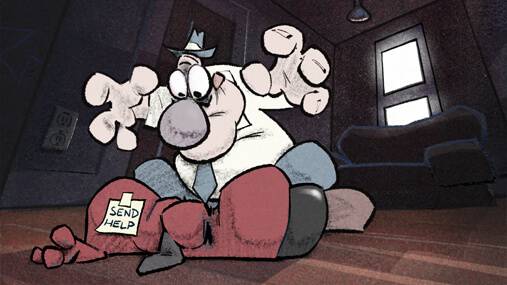Interview with ‘Cooped’ director Mike A. Smith
UPDATE: You can now watch Mike A. Smith’s Cooped online in full (see below)
Earlier this year at Bristol Encounters we had the opportunity to watch what has quickly become one of our favourite films of 2015. Mike A. Smith of Ten Pound Toons in Portland has produced a charming piece of 2D animation in the form of Cooped, the story of a dog who longs to be outside.
The film brings together a range of inspirations, from Tex Avery to John Kricfalusi, demonstrating a highly cartooney style of animation, with perfect slapstick timing. A simple idea done well, it’s easy to see why the film has performed so well at festivals. Working on a multitude of freelance jobs both during and after Cooped, we were able to squeeze a little time into Mike’s busy schedule to talk to him about where this lovable dog came from:
What was the initial inspiration for the film?
At the time, I was doing freelance animation while living with a couple of dogs, and the dogs were providing better material than the stuff I was getting paid for. So I started thinking about making a three- or four-minute dog cartoon; just something fun to do to clean the pipes out. It ended up growing to nine minutes and outlasting my commercial work.
I understand you have a dog yourself, was he useful for reference?
It was actually a friend’s dog that was the muse for the film. This was a big red lab named Caillou, and he was either dopey or gallant-looking, depending on how the light hit him. Pathos and comedy just radiated from him. He would look mournfully look at the door a lot.
 Who/where have you drawn inspiration from visually over the years?
Who/where have you drawn inspiration from visually over the years?
I try to draw from a wide variety of sources— I’m really into Oceanic and African art– but my foundation is the rubbery, cartooney stuff, especially shorts from the 1930s and ’40s. I look to directors and animators like Bob Clampett, Tex Avery, Dave Fleischer, Emery Hawkins, Rod Scribner, Manny Gould, and Jim Tyer. Newspaper comics from that era figure in there too (E.C. Segar, Cliff Sterrett, Walt Kelly), along with some latter-day animators like Cordell Barker, Richard Condie, John Kricfalusi and Kaj Pindal. With all of that, Cooped ends up being something of a throwback.
Cooped, as well as your previous films, really showcases your animation knowledge and ability. What has been your animation background up to this point?
It’s been a bit of a roundabout. I was consumed with animation as a kid. A couple friends and I borrowed a Super 8 camera and made stop-mo films of clay guys fighting monsters with toothpick swords. The characters would get droopy in the heat of the sun. We could never tell how much film was left in the cartridge, so we’d just keep shooting until the camera stopped. I was the only one of us to really catch the animation bug out of that experience, and I kept on re-borrowing that camera throughout high school, messing around with pencils and markers and cutouts. I read everything I could find on animation, and had The Illusion of Life and Shamus Culhane’s books checked out of the library for months at a time.
It wasn’t until my late twenties that I got serious about things and went to art school (Pacific Northwest College of Art, in Portland). By that point, I was watching Golden Age cartoons one frame at a time, but I didn’t really know anything about filmmaking. I didn’t know the language of cinema, didn’t know story structure, didn’t know sound design… So if I’ve developed any skills in those areas, it’s to the credit of my teacher, Rose Bond. I ended up making a handful of student films, a couple of which I have a hard time watching now. That eventually led me to ASIFA, freelancing, and independent film, all while these massive animation resources were opening up online. Having all of that available makes it pretty easy to keep inspired, and to keep learning.
 Cooped is currently doing the rounds at festivals. How have you found the response?
Cooped is currently doing the rounds at festivals. How have you found the response?
Really good! Cooped isn’t terribly heavy or high-artsy, which means that some festivals don’t want it, while others want it as a sort of icebreaker. The lack of dialogue lets it play well with international audiences, and it’s interesting to see which gags land the best. Old-fashioned physical comedy still works. I wish I could travel to more festivals than I do– the ones that I have made it to have been so energizing. It’s great to meet other animators, to recognize others of your own tribe. It’s really motivating me to work on my next film.
Do you have a personal process for developing the ideas for all your films?
Coming up with ideas is tough, but I seem to get my best ideas while walking. I find that if I sit down and try to have a good idea, it’s not going to happen. If I can fool my brain by doing something else, those ideas get shaken loose more easily. Walking works well for me– if nothing else, I end up getting some fresh air.
I also meet on a monthly basis with a group of other independent animators here in Portland. We eat pizza, show our works in progress, and talk about them. With Cooped, those meet-ups were crucial in getting the kinks out of the story.
 What type of techniques and software do you use to make your work, and how do you keep it looking so lively throughout?
What type of techniques and software do you use to make your work, and how do you keep it looking so lively throughout?
Cooped is the first film that I’ve made without paper. It’s all done on a Cintiq tablet using TV Paint, which I enjoy drawing in. It’s raster-based and does really well with loose, sketchy drawings, which helps to keep things lively. Vector-based animation software like Flash feels too computer-y to me, making it too easy to futz a drawing to death. This may just be my own quirk.
How do you fit your personal work in around your schedule?
It is hard to find the time, especially in the early stages of a project, but there seems to be a tipping point when the project takes on a life of its own. Then, I’ll find myself waking up at odd hours of the morning with ideas that need to be worked on immediately. Things like breakfast and entertainment get forgotten. I wish I knew a better way of doing this, but this sort of benign madness seems to be a necessary part of getting a project done. Hopefully the things that fall by the wayside aren’t that important.
What are you working on currently?
I’ve started on a hand-drawn short about a guy, an elephant, a temple, and the collapse of civilization. It’s letting me draw a lot of anthropological material, which is fun. I’m still in early pre-production, but I’m starting to break over that ridge where the ideas start happening all on their own. I may end up adding more elephants.
Cooped will screen 3:30pm tomorrow as part of our MAF showcase screening Fetching Fascinations at Manchester’s HOME. For more on Mike’s work visit tenpoundtoons.com

